
Archips xylosteana, the variegated golden tortrix or brown oak tortrix, is a moth of the family Tortricidae.

Aleimma loeflingiana is a moth of the family Tortricidae. It is found in Europe and the Near East.

Celypha cespitana is a moth of the family Tortricidae. It is found in the Palearctic realm, from western Europe to the Ural Mountains, Transcaucasia, Asia Minor, the Near East, Iran, Russia, north-eastern China (Manchuria), Korea and Japan. It is also found in the Nearctic realm.

Acleris rhombana, the rhomboid tortrix, is a moth of the family Tortricidae. It is found in the Palearctic realm, from Europe to the Caucasus, Armenia, and Turkmenistan.
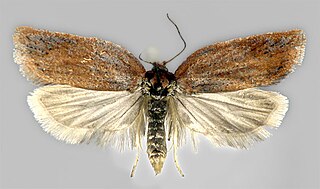
Acleris rufana is a moth of the family Tortricidae. It is found from northern, central and south-western Europe through southern Siberia to the Russian Far East and Japan.
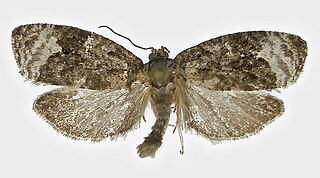
Apotomis capreana is a moth of the family Tortricidae. It is found in most of Europe, east to the eastern part of the Palearctic realm.

Cochylis hybridella is a moth species of the family Tortricidae. It is found in most of Europe, the Near East, China, Japan, Korea and Russia.

Apotomis betuletana is a moth of the family Tortricidae. It is found in most of Europe. It is also found in the eastern part of the Palearctic realm.

Acleris holmiana, the golden leafroller moth, is a moth of the family Tortricidae. It is found in most of Europe and Asia Minor.

Cochylichroa atricapitana, the black-headed conch, is a moth of the family Tortricidae. It is found in China (Xinjiang) and the eastern Palearctic and most of Europe.
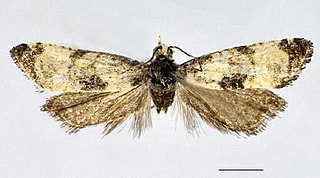
Cochylis dubitana, the little conch, is a moth of the family Tortricidae. It is found in China (Heilongjiang) and most of Europe. and the Caucasus. It is also found in North America, where it has been recorded from Colorado, Maine, Ontario and Washington.

Ancylis myrtillana is a moth of the family Tortricidae. It was described by Treitschke in 1830. It is found in most of Europe and across the Palearctic.It has also been recorded in North America. The habitat consists of moorland.

Acleris schalleriana, the viburnum button or Schaller's acleris moth, is a moth of the family Tortricidae. It was described by Carl Linnaeus in 1761. It is found in most of Europe. It is also found in North America. Acleris viburnana is a possible synonym that refers to the North American populations.
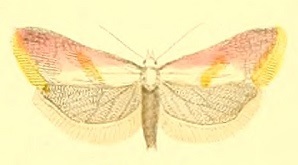
Cochylis flaviciliana, the gold-fringed conch, is a moth of the family Tortricidae. It was described by Westwood in 1854. It is found in most of Europe and north-western Africa. The habitat consists of chalky grasslands.

Cochylis pallidana, the sheep's-bit conch, is a moth of the family Tortricidae. It was described by Zeller in 1847.

Cnephasia longana, the omnivorous leaftier moth, long-winged shade or strawberry fruitworm, is a moth of the family Tortricidae. It was described by Adrian Hardy Haworth in 1811. It is native to western Europe. It is an introduced species in western North America. The species has also been reported from north-western Africa and Asia. The habitat consists of downland and rough ground.

Cochylimorpha straminea, the straw conch, is a species of moth of the family Tortricidae. It is found in most of Europe, Morocco, Algeria, Tunisia, Asia Minor, the Palestinian territories, Iraq, Syria, Armenia, Transcaspia, Turkmenistan and Iran.
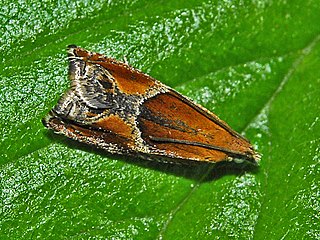
Ancylis obtusana, the small buckthorn roller, is a moth of the family Tortricidae.

Bactra furfurana, the mottled marble, is a moth of the family Tortricidae described by Adrian Hardy Haworth in 1811. It is found in the Nearctic and Palearctic realms.

Ancylis unguicella is a moth belonging to the family Tortricidae. The species was first described by Carl Linnaeus in his landmark 1758 10th edition of Systema Naturae.




















